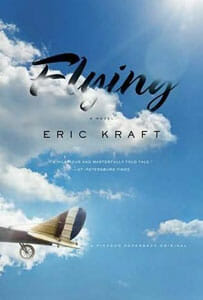
A soaring American life remembered and misremembered
Less than 10 pages into Flying, having already laughed aloud several times, I was struck by a question too seldom asked when trying out a new author: “How is it that I’ve never heard of this guy?” Though Eric Kraft is prolific, talented, literary-minded and genuinely hilarious, I’d never read any of his work before his most recent release. And he’s been publishing these strange and terrific novels since the late 1980s.
My unfamiliarity with Kraft is actually no surprise, though. Such is a common enough fate for authors writing funny books, which are easy to miss and seldom taken seriously by reviewers. Fellow comic author Julian Gough bemoaned this problem and the state of modern, unfunny literature in his essay “Divine Comedy,” wondering “What is wrong with the modern literary novel? Why is it so worthy and dull? Why is it so anxious? Why is it so bloody boring?” Readers of contemporary fiction might understand what he means. I certainly do, which is why I felt such gratitude at having happened upon Kraft, who is anything but boring, and has been a favorite to an in-the-know cult for years.
Flying itself is an uncommon publishing experiment. In it, two of Kraft’s previously released novels are reprinted along with a new book, the final installment of the trilogy. Like all of the writer’s 12 books, these three are centered on protagonist Peter Leroy, a man whose life is characterized by distracted, nostalgic flights of fancy and reveries about any number of ideas, practical, philosophical and nonsensical. His woolgathering is so chronic and overwhelming that he can only drive a car when his wife is along for the ride, shouting him back to reality when he begins to drift. Though Leroy and his endless memoirs have been the subject of several previous novels (and though there are inside jokes and references for readers better versed in the larger work), Flying feels completely independent and serves as an excellent introduction to what Kraft calls, rather grandly, The Personal History, Adventures, Experiences & Observations of Peter Leroy.
In Flying, Peter Leroy recalls, from the vantage of old age, the story of the summer between his junior and senior years of high school, 50 years earlier. That summer, with the help of classmates and members of his small Long Island community, he built a flying machine, an “aerocycle,” which he then piloted—or so he allowed everyone to believe—from his home on Long Island to a summer academy for exceptional students in New Mexico. In present day, Peter and his wife, Albertine, decide to retrace his original route, exploring both a country and a man much changed since his initial ride.
In Flying, almost all the new people the narrator meets exhibit behavior bizarre enough to make them candidates for the psych ward or wisdom so uncanny they’d qualify as sages. These outrageous interactions make for fun reading, but as they add up, the ring of truth and its accompanying strength is at times sapped from the text—a common enough hazard for the funny writer.
On other occasions, the laffs veer into the realm of tedium, and it’s clear that certain scenes were more amusing to write than they are to read. A cutesy re-enactment of the famous cropduster-in-a-cornfield scene from North by Northwest is written as if witnessed by our narrator from the porch of a nearby house, but once the gag is understood, reading the detailed description is a slog. In another instance, young Peter and a friend gain access to a junkyard by slipping the guard dog a mickey buried in a ball of ground chuck. It is a scene so ordinary and common that even if it is intended as homage to some earlier work, it’s agonizing to see it again.
Still, one is left feeling that Kraft has achieved exactly what he intended in this book about finding the truth in one’s past—the truth as it was lived and the truth as one chooses to remember it. Strangely enough, the plot is the least interesting thing about Flying. One isn’t driven to read on in order to discover the outcome. Instead, like Peter Leroy himself, one is driven onward because the trip is so much fun.